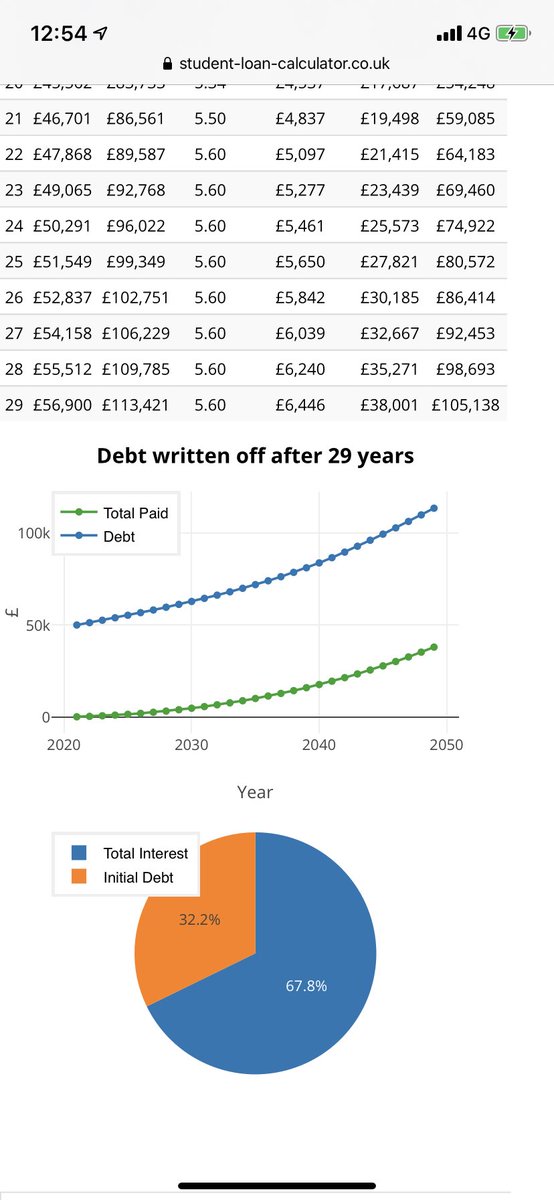Weird feeling. After 10.5 years and roughly £21,000 of debt- I finally paid off the last instalment of my student loan today.
Next month, for the first time- I’ll receive my full post tax salary, for the first time since I graduated.
Next month, for the first time- I’ll receive my full post tax salary, for the first time since I graduated.
Sharing as an example of how the system works in practice. In truth I only seriously started paying off the capital in the last few years, when I started to earn a good salary, paying roughly £400 a month off. I suspect many will never significantly eat into the capital.
That’s especially the case for those those under the new regime, who have over £50k of debt. I was lucky in a) lower fees (3k not 9k) and maintenance grant (not loan) still existed.
Indeed IFS forecasts that 83% of students from PST 2012 reforms won’t fully pay back their loan.
Indeed IFS forecasts that 83% of students from PST 2012 reforms won’t fully pay back their loan.
Of course those who don’t pay off their fees, the cost will eventually have to be absorbed by the Treasury. Having 17% pay back all and the rest some will still be cheaper for HMT than no loans at all. But we should recognise the a) odd conceit that we have a system of loans...
...which the vast maj will never pay back and that instead b) that graduates are paying in effect a topped up rate of income tax for many, many years.
There are two other things to say about the system 1) the fact of this topped up income tax is another burden for graduates trying to accumulate capital for buying a house/save for a pension etc 2) there is an inequity issue. Wealthier students often receive support...
...from family to reduce (or eliminate) their loans. With George Osborne’s abolition of the maintenance grant (and replacement with another loan) that inequity has become greater. Poorer students start working life as poorer graduates...
...taking home less of their salary than their more privileged counterparts.
Of course, HE has to be paid for and graduates pay according to their ability to do so (as their salary goes up). But as I say, important to see the system for what it is and how it works in practice.
Of course, HE has to be paid for and graduates pay according to their ability to do so (as their salary goes up). But as I say, important to see the system for what it is and how it works in practice.
Graduates graduating today will often have over £50k of debt. An enormous figure especially when one considers their experiences of late and labour market they’re graduating into.
Even when things get better and *some* get good salaries it will take them many, many years- paying a big chunk of their post tax salaries to get into any position of paying it off.
The rest will likely have it hovering over them, in one form or another, until their 50s.
The rest will likely have it hovering over them, in one form or another, until their 50s.
I have no complaints. I have a good job and benefitted hugely from my degree. That said, for the present cohort and that of the last few years there remain questions about a) intergenerational equity b) equity within their generation (for reason identified above)...
...c) sustainability of the student loan book long term. Truth is many politicians have in effect simply deferred the long term cost to the public purse to the decades hence, when many fail to repay. And who will have to deal with that? Ah yes- the grown up students.
To expand on this point for those asking- effectively we have created a system where the same two graduates, earning the same salary, in the same job might have quite substantially different take home pay. And that will most likely be as a result of their family background. https://twitter.com/lewis_goodall/status/1361270555966586880
And I should mention something about interest. I paid a lower rate of interest than current students. For those starting in 2020 in England and Wales their rate of interest is 5.6%. So a third year student who owes £30,000 will have £1,680 added to their debt this year.
Therefore, many students will find the capital they owe, even when in work, going up, not down.
You might ask whether that on top of the de facto graduate tax the Plan 2 students are paying, the very large capital sums they must repay, whether an interest rate of 5.6% makes any prospect of repayment, for all those outside the very top jobs, remotely credible.
As a result of the interest, many graduates work for years while their stock of debt goes *up*
So let’s take a graduate on Plan 2 with a debt of £50k and a v respectable starting salary of £28,500.
Despite a good, rising salary their debt *never goes down*. Rises to £113k.
So let’s take a graduate on Plan 2 with a debt of £50k and a v respectable starting salary of £28,500.
Despite a good, rising salary their debt *never goes down*. Rises to £113k.
The system I was on (Plan 1) I think can (just) accurately be called a student loan system. The fees were much lower, the maintenance grant still exist to leaven some inequalities and the interest was lower.
For Plan 2 (since 2012) those things are no longer the case.
For Plan 2 (since 2012) those things are no longer the case.
I’m not saying whether the contributory principle is right or wrong, that’s for others to argue about: what I’m saying is that in particular, post-2012, we in fact have a de facto graduate tax. There’s no realistic prospect of many graduates paying back the stock of debt...
...and so it is, in effect, an extra income tax levy which will exist on graduates for 30 years. The debt will simply escape them and payments continue. I suspect older generations are ignorant of how the system operates in reality simply because they’ve never experienced it.
The fact that it is a de facto graduate tax generates all sorts of policy questions and it’d be better for the graduates and for policy makers to recognise it and treat it as such.
End.
End.
Actually, let me rephrase- it's a graduate tax which tends to fall most heavily on those from the poorest backgrounds (and some from wealthier ones escaping it altogether)
Sutton Trust says student from households in the lowest 40% of earners take on average debts of £51,600...
Sutton Trust says student from households in the lowest 40% of earners take on average debts of £51,600...
...compared to £38,400 in the top 20% of households.
As I say, the abolition of the maintenance grant was an crucial in making the system more regressive. ST estimates that introducing a system of means-tested fees and reinstating MGs would cut average student debt...
As I say, the abolition of the maintenance grant was an crucial in making the system more regressive. ST estimates that introducing a system of means-tested fees and reinstating MGs would cut average student debt...
...in half. In particular, it would slash debt among the 40% poorest students by 75%, from £51,600 down to £12,700, and mean those from the poorest backgrounds emerged with two thirds less debt than their better-off counterparts.

 Read on Twitter
Read on Twitter



